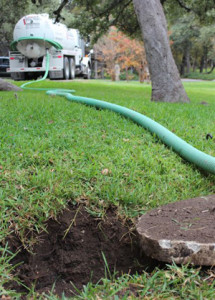For service call (210) 890-2778
or click here to request service
What Happens During a Septic System Inspection: Part II

We’ve already talked about visual inspections and why they’re risky. Now lets go over a full inspection, which includes an inspection and a tank pumping at the same time.
Full inspections 101
This is the most thorough inspection for conventional/standard septic systems and low-pressure dosing systems.
The tank is opened and the liquid level is checked, which may indicate if the tank is leaking or if it is overfull. As long as the level is normal, then water is introduced to the system to make sure the water is flowing from the house to the tank, and then from the tank to the absorption area. The liquid level should not rise in the tank and there should be no surfacing effluent over any portion of the system.
Next, the tank is pumped down to check for backflow from the absorption area, which indicates if the absorption area is absorbing the wastewater that was introduced. The flow from the house to the tank is checked to make sure everything is connected to the system, and can indicate if there may be blockages in the house plumbing or in the sewer line between the house and the tank.
Pumping can uncover other problems
Since septic tanks should be pumped every three to five years (on average), the entire tank is usually pumped during the inspection, with a couple exceptions:
- If the tank was recently pumped and there are no solids in the tank. In this case, a thorough inspection can still be provided by pumping the liquids down past the outlet baffle so that it can still be monitored for backflow from the absorption area.
- If the system fails the inspection before the pumping is performed (leaking tank, overfull tank, there is backup while running water in the house, etc.).
Your inspector should have questions
When a septic inspection is scheduled, the inspector should ask many questions in order to be informed about past system usage, current usage, future usage, past maintenance, etc. These factors can affect what is seen during the inspection help the inspector decide if it is an issue or not.
For example, the inspector opens the tank and the liquid level is low. Is the liquid level low because the tank is leaking, or because the tank was recently pumped while the house was vacant and no one has been living there to fill the tank to its normal level? Knowing these factors will help determine if further investigation is required or if repairs are required.
Regulations knowledge is critical
The TCEQ sets minimum standards for the state of Texas; however, each county/local authority can have more stringent regulations. For example, the TCEQ setback requirement from the absorption area to a well is 100 feet; however, in Bexar County, the requirement is 150 feet.
Comal and Kendall County for the most part stick with the TCEQ regulations, but the regulations may be interpreted differently by each county. For example, one county may allow an old tank to be replaced, but another county may require an entire new system.
It’s important that the inspector know what is required locally for each property so recommendations coincide with local requirements and negotiations can be made according to accurate information.
Choose the experts
Van Delden Wastewater Systems is a leader in the real-estate industry. Our inspectors are TCEQ Licensed Installers and NAWT Certified Inspectors. We perform approximately 400 inspections each year and have over 30 years combined experience.
We instructed a NAWT re-certification class for the Texas Association of Real Estate Inspectors (TAREI) in January 2011, and provided continuing education for TAREI and the Central Texas Environmental Health Association (CTEHA) in 2013. Read an article about the class here, or see the video below.
Have questions or need to schedule an inspection? Contact us online or give us a call today!
